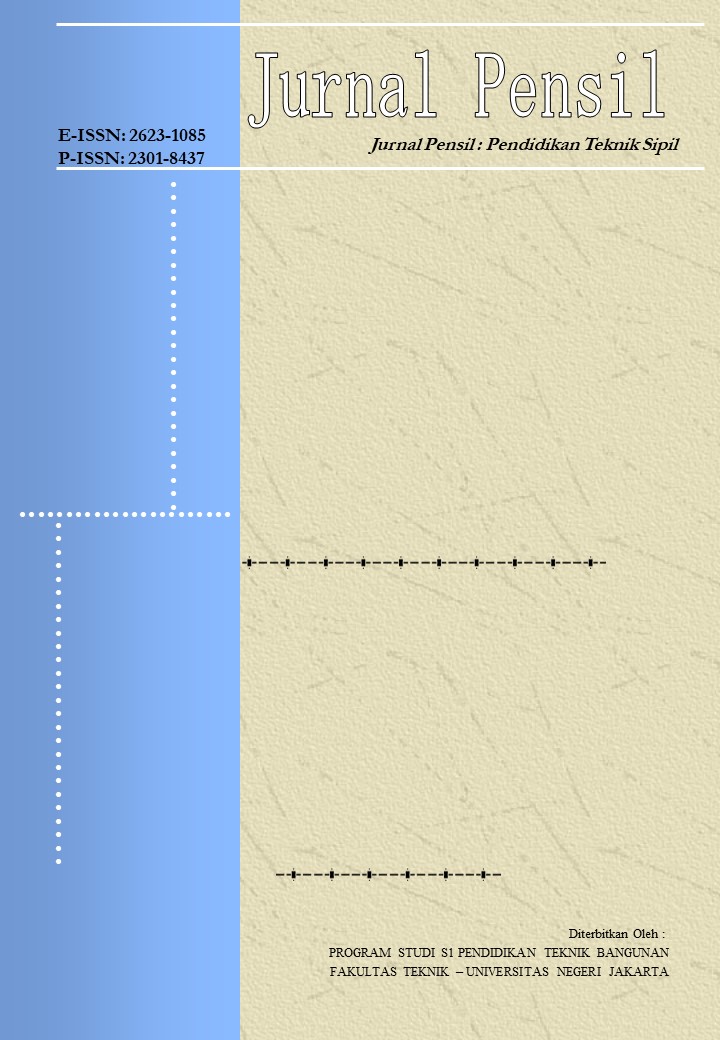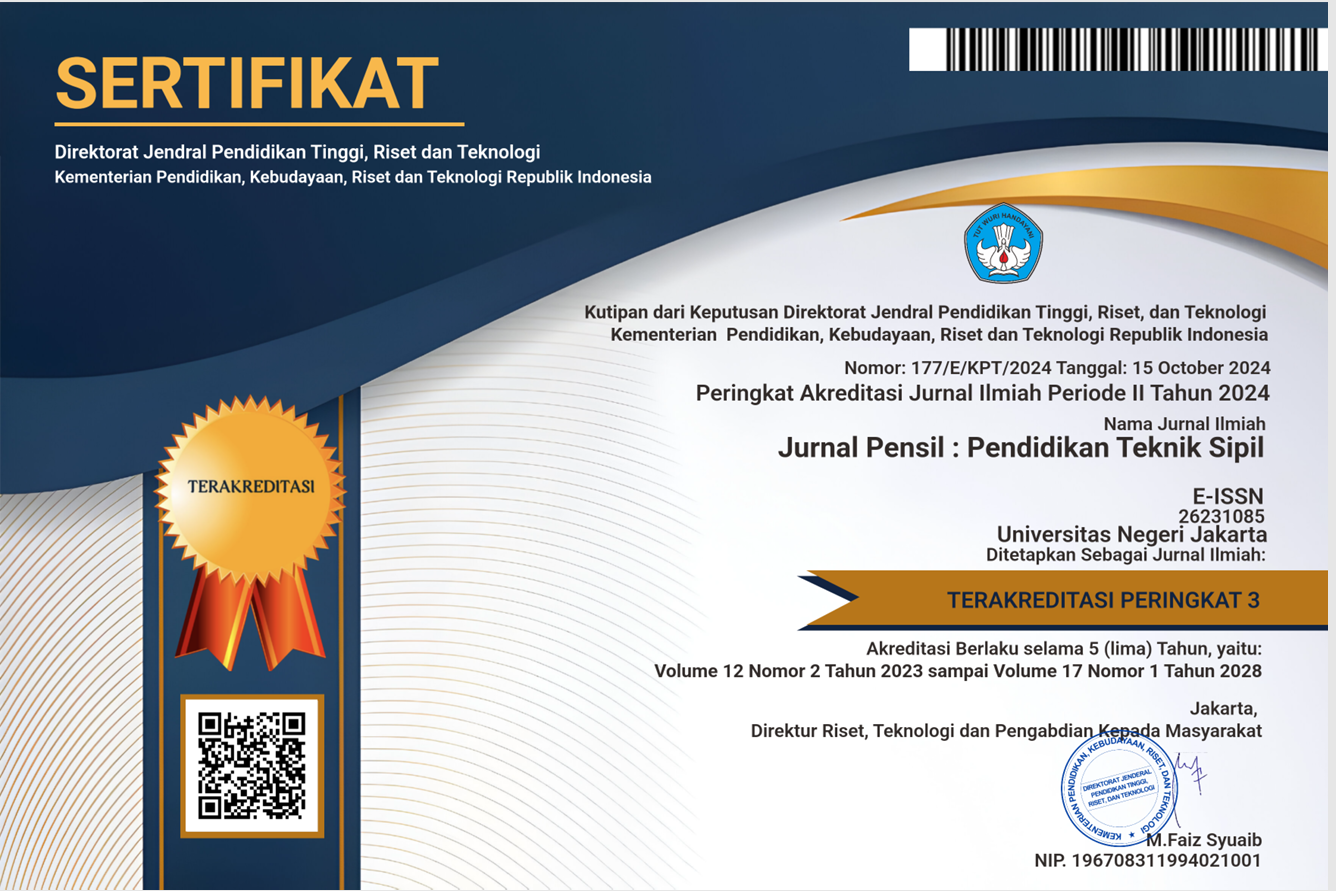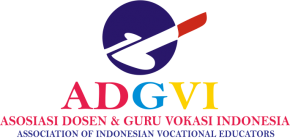RELEVANCE EMPLOYABILITY SKILLS OF VOCATIONAL HIGH SCHOOL STUDENTS’ DEPARTMENT OF SANITATION BUILDING CONSTRUCTION AND MAINTENANCE IN DIY TO THE CONSTRUCTION SERVICE INDUSTRY
DOI:
https://doi.org/10.21009/jpensil.v11i3.27157Keywords:
Employability Skills, Construction Service Industry, KGSP of Vocational High SchoolAbstract
This study aims to prove the importance of employability skills for the construction service industry for graduates of vocational high school majoring in Sanitation Building Construction and Maintenance (KGSP), revealing the implementation of employability skills and their suitability at vocational high school majoring in KGSP in DIY, and describing the level of relevance of employability skills of vocational high school students majoring in KGSP in DIY to the construction service industry. This type of research uses a descriptive quantitative approach and uses a survey method. The research was conducted in vocational schools and the construction service industry in DIY. The research subjects were the head of the company, project manager, engineer, surveyor, and vocational students majoring in KGSP in DIY. Collecting data using observation and questionnaires. The results of the study show: (1) employability skills are very important and needed by the construction service industry for graduates of vocational high school majoring in KGSP obtaining 85.95% with a very important category, employability skills needed by the construction service industry in total are 54 points (2) vocational high school majoring in KGSP implement employability skills obtained 84.01% in the very appropriate category or taught by teachers in schools, the overall employability skills implemented were 45 points (3) the level of relevance of employability skills of vocational students to the world of industrial work obtained 83.3% with a very relevant category.
References
Abdullah, Q. A., Humaidi, N., & Shahrom, M. (2020). Industry Revolution 4 . 0 : The Readiness Of Graduates Of Higher Education Institutions For Fulfilling Job Demands. Romanian Journal Of Information Technology And Automatic Control, 30(2), 15–26.
Adha, L. H., Asyhadie, Z., & Kusuma, R. (2020). Indonesia Industrial Digitalization and Its Impact on Labor and. Jurnal Kompilasi Hukum, V(2), 32.
Adi, & Adillah. (2012). Sertifikasi Tenaga Kerja Konstruksi Sebagai Unsur Pendukung Pembangunan Infrastruktur. Universitas Sultan Agung.
Aktas, F., Pitts, K., Richards, J. C., & Silova, I. (2017). Institutionalizing global citizenship: A critical analysis of higher education programs and curricula. Journal of Studies in International Education, 21(1), 65–80. https://doi.org/10.1177/1028315316669815
Alaloul, W. S., Liew, M. S., Zawawi, N. A. W. A., & Kennedy, I. B. (2020). Industrial Revolution 4.0 in the construction industry: Challenges and opportunities for stakeholders. Ain Shams Engineering Journal. https://doi.org/10.1016/j.asej.2019.08.010
Ali, M. (2013). Analisis Kesiapan Smk Rsbi Dalam Peningkatan Daya Saing Lulusan. Jurnal Kependidikan: Penelitian Inovasi Pembelajaran, 43(1), 78–86.
Almira, D., Dardiri, A., & Isnandar, I. (2016). Kompetensi Lulusan SMK Program Keahlian Teknik Bangunan Kompetensi Keahlian Teknik Konstruksi Batu dan Beton yang Dibutuhkan Industri Jasa Konstruksi di Jawa Timur. Jurnal Pendidikan: Teori, Penelitian, Dan Pengembangan, 1(4), 673–680.
Diwangkoro, E., & Soenarto, S. (2020). Development of teaching factory learning models in vocational schools. Journal of Physics: Conference Series, 1456(1). https://doi.org/10.1088/1742-6596/1456/1/012046
Eko. (2019). Tantangan Pengembangan SDM Polri di Era Revolusi Industri 4.0. Ilmu Kepolisian, 13(2), 90–105.
Fauzi, M., Neolaka, A., & Arthur, R. (2017). Pengaruh Efektivitas Praktik Kerja Industri Terhadap Kesiapan Kerja Siswa Kelas XI Program Keahlian Teknik Bangunan SMK Negeri 1 Cibinong Kabupaten Bogor. Jurnal PenSil, 6(1), 15–20. https://doi.org/10.21009/jpensil.v6i1.7247
Ganesan, G., & Ashok Kumar, M. (2015). Employability Skill: A Literature Review Related papers A St udy on Self-Percept ion t owards Basic Employabilit y Skills among Post Graduat es St uden… Employability Skill: A Literature Review. International Journal of Advance Research in Computer Science and Management Studies, 3(3).
Goodman, S., & Tredway, G. (2016). Antecedents of perceived graduate employability: A study of student volunteers in a community-based organization. SA Journal of Industrial Psychology, 42(1), 1–10. https://doi.org/10.4102/sajip.v42i1.131
Hakim, D. R., & Fitri, E. N. (2020). Membangun Daya Saing Siswa Smk Melalui Optimalisasi Employability Skill Dan Kompetensi. Edutech, 1(1), 50–70.
Hamdan, H. (2018). Industri 4.0: Pengaruh Revolusi Industri Pada Kewirausahaan Demi Kemandirian Ekonomi. Jurnal Nusantara Aplikasi Manajemen Bisnis, 3(2), 1. https://doi.org/10.29407/nusamba.v3i2.12142
Hastutiningsih, A. D., Sugiyono, S., Suyanto, S., & Wibowo, U. B. (2022). Strategi Jurusan Pendidikan Teknik Sipil dan Perencanaan Menghadapi Revolusi Industri 4.0: Studi Kasus di DIY. Jurnal Pendidikan Teknik Sipil, 4(1), 38–45. https://doi.org/10.21831/jpts.v4i1.49503
Himawati1, I. P., Nopianti, H., & Diyas Widiyati. (2020). Sosialisasi Pengetahuan Mengenai Peluang dan Tantangan di Era Revolusi Industri 4.0 pada Pelajar di Sekolah Menengah Atas dan Kejuruan di Kota Bengkulu. Widya Laksana, 9(2), 205–212.
Iyer, V. M., & Dave, K. (2015). Industry’s role in employability. Industrial and Commercial Training, 47(3), 151–158. https://doi.org/10.1108/ICT-11-2014-0072
Kornelakis, A., & Petrakaki, D. (2020). Embedding employability skills in UK higher education: Between digitalization and marketization. Industry and Higher Education, 34(5), 290–297. https://doi.org/10.1177/0950422220902978
Marsudi, a. S., & Widjaja, Y. (2019). Industri 4.0 dan Dampaknya terhadap Financial Technology serta Kesiapan Tenaga Kerja di Indonesia. Ikraith Ekonomika, 2(2), 1–10.
Maysitoh, Agung, D. F., & Afdal. (2018). Pendidikan Kejuruan di Era Industri 4.0: Tantangan dan Peluang Karier. Indonesian Journal of School Counseling, 3(3), 89–96. https://doi.org/http://dx.doi.org/10.23916/08403011%0D
Nirmalawati, Labombang, M., & Asnudin, A. (2012). Supply and Demand of Road Construction Experts in The Province of Cetral Sulawesi. Infrastruktur, 3(1), 40–49.
Oktaviastuti, B., Nurmalasari, R., & Damayanti, F. (2021). Urgensi Technical Skill Bagi Tenaga Kerja Konstruksi Dalam Era Industri 4.0. Rekayasa: Jurnal Teknik Sipil, 5(2), 7. https://doi.org/10.53712/rjrs.v5i2.1021
Oresanya, T. O., Omodewu, O. S., Kolade, T. T., & Fashedemi, A. O. (2014). Vocational Education and Employability : The Nigerian Situation. 5(2009), 2013–2015.
Pratama, Y., Daryati, D., & Arthur, R. (2018). Hubungan Praktik Kerja Industri dengan Kesiapan Kerja Siswa SMK Negeri 1 Cibinong Kelas XII Kompetensi Keahlian Teknik Gambar Bangunan. Jurnal PenSil, 7(1), 53–62. https://doi.org/10.21009/pensil.7.1.6
Pusriawan, P., & Soenarto, S. (2019). Employability skills of vocational school students in Palu City for entering the work world. Jurnal Pendidikan Vokasi, 9(1), 33–42. https://doi.org/10.21831/jpv.v9i1.23351
R, A., Kamin, Y. Bin, & Saud, M. S. Bin. (2013). Acquisition of Employability Skills in Technical Vocational Education; Necessity For The 21st Century Workforce. Aust J Basic and Applied Sci, 7(6), 9–14.
Rachmad Prihadi, W. (2019). Model Teacherpreneur Pada Pembelajaran Vokasi Menghadapi Era Disrupsi Dan Revolusi Industri 4.0. Jurnal Pendidikan Teknik Sipil, 1(1). https://doi.org/10.21831/jpts.v1i1.28274
Ramadhan, M. A., Iriani, T., & Handoyo, S. S. (2013). Relevansi Kompetensi Lulusan SMK Khususnya Kompetensi Keahlian Teknik Gambar Bangunan dengan Kompetensi yang Dibutuhkan di Dunia Kerja. Jurnal PenSil, 2(1), 1–10. https://doi.org/10.21009/jpensil.v2i1.7282
Rasul, M. S., Rauf, R. A. A., Mansor, A. N., Yasin, R. M., & Mahamod, Z. (2013). Graduate Employability For Manufacturing Industry. Procedia - Social and Behavioral Sciences, 102(Ifee 2012), 242–250. https://doi.org/10.1016/j.sbspro.2013.10.739
Ridwan, M. (2021). Pembangunan Sumber Daya Manusia Pada Sekolah Kejuruan Di Indonesia: Tantangan Dan Peluang Di Era Revolusi Industri 4.0. Moderasi: Jurnal Studi Ilmu Pengetahuan Sosial, 2(1), 1–10. https://doi.org/10.24239/moderasi.vol2.iss1.35
Riyoko, S. (2012). Studi Penentu Daya Saing Terhadap Investasi pada Industri Mebel di Kabupaten Jepara. Jurnal Dinamika Ekonomi & Bisnis, 9(1), 33–44.
Rowe, A. D., & Zegwaard, K. E. (2017). Developing graduate employability skills and attributes: Curriculum enhancement through work-integrated learning. Asia-Pacific Journal of Cooperative Education, 18(2), 87–99.
Sa-Nguanmanasak, T., & Khampirat, B. (2019). Comparing employability skills of technical and vocational education students of Thailand and malaysia: A case study of international industrial work-integrated learning. Journal of Technical Education and Training, 11(3), 94–109. https://doi.org/10.30880/jtet.2019.11.03.012
Shakir, R. (2009). Soft skills at the Malaysian institutes of higher learning. Asia Pacific Education Review, 10(3), 309–315. https://doi.org/10.1007/s12564-009-9038-8
Sudira, P. (2018). Metodologi Pembelajaran Vokasional Abad XXI Inovasi, Teori, dan Praksis. UNY Press.
Sunardi, Purnomo, & Sutadji, E. (2016). Pengembangan Employability Skills Siswa Pendekatan Saintifik. Jurnal Pendidikan, 1(7), 1391–1398.
Sung, T. K. (2018). Industri 4.0: a Korea perspective. Technological Forecasting and Social Change Journal, 132, 40–45. https://doi.org/https://doi.org/10.1016/j.techfore.2017.11.005
Tjandrawina Raymond. (2016). Industri 4.0: Revolusi industry abad ini dan pengaruhnya pada bidang kesehatan dan bioteknologi. Jurnal Medicinus, Vol 29, Nomor 1, Edisi April. Jurnal Medicinus, Vol 29, No(1), 31–39.
Venugopal, K., & Kumar, V. S. (2022). Graduates Employability Skills and Placements - Mediating Role of Career Adaptability. International Journal of Management and Humanities, 8(9), 38–42. https://doi.org/10.35940/ijmh.j1490.058922
Wijayanti, M., & Jaedun, A. (2019). Relevansi Kompetensi Lulusan Kejuruan Teknik Bangunanuntuk Bekerja Di Industri Konstruksi. Jurnal Kependidikan, 3(1), 81–94.
Yahya, M. (2018). Era Industri 4.0: Tantangan Dan Peluang Perkembangan Pendidikan Kejuruan Indonesia. Pidato Pengukuhan Penerimaan Jabatan Professor. https://doi.org/https://doi.org/10.1080/15298868.2011.636509.











.png)
.png)
1.png)

